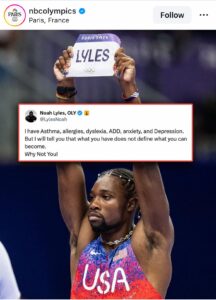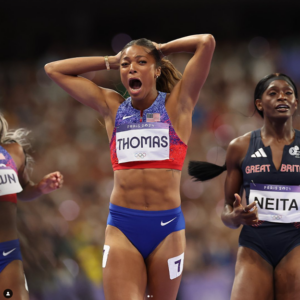Real-life wisdom from the 2024 Paris Olympics
Living in such fractured political times, it’s easy to get caught up in thinking no one agrees on anything anymore. But watch a night or two (or 16!) of the 2024 Paris Summer Olympics and it’s easy to catch the collective joy from athletes and spectators alike. Here are a few bits of insight we could all learn from these Games.
Celebrate our heroes
Consider the spontaneous outpouring of affection for U.S. pommel horse bronze medalist Stephen Nedoroscik –dubbed “an American gymnastics superhero” by NBC Sports. Or the endearing tale of Ukrainian world-record high jump gold medalist Yaroslava Mahuchikh. She and other athletes from war-ravaged Ukraine are finding ways to rise above the conflict, as she explained to the Associated Press, “The Olympic Games are about peace.”
It’s not magical thinking to believe there is someone like these two unlikely heroes in every community. We just need to look for them—the ones out front, and those yet to be noticed.
Elevate focus on mental health
 One refreshing difference I’ve observed in the coverage of the Paris Olympics over every previous competition is the frank exploration of mental health challenges experienced by so many of our star athletes. NBC even hosted an Olympic Games Primetime panel discussion on mental health. Prior to these Games, standout gymnast Simone Biles and swimmer Caeleb Dressel took breaks from training to reassess their approach to sport. Both seemingly have emerged more resilient and happier now that they are focusing on mental strength as well as their superb physical prowess. Olympic runner Noah Lyles posted on social media hours after his thrilling gold medal victory in the 100-meter race: “I have asthma, allergies, dyslexia, ADD, anxiety and depression. But I will tell you that what you have does not define what you can become.”
One refreshing difference I’ve observed in the coverage of the Paris Olympics over every previous competition is the frank exploration of mental health challenges experienced by so many of our star athletes. NBC even hosted an Olympic Games Primetime panel discussion on mental health. Prior to these Games, standout gymnast Simone Biles and swimmer Caeleb Dressel took breaks from training to reassess their approach to sport. Both seemingly have emerged more resilient and happier now that they are focusing on mental strength as well as their superb physical prowess. Olympic runner Noah Lyles posted on social media hours after his thrilling gold medal victory in the 100-meter race: “I have asthma, allergies, dyslexia, ADD, anxiety and depression. But I will tell you that what you have does not define what you can become.”
This is inspiration for every young person who may be questioning the state of their own mental health, and to feel supported in seeking help. And young or old, we can all benefit from a pause in our lives to reassess how to make our mental health matter.
Maintain a level playing field for the benefit of all
 The International Olympic Committee and various sport associations work to make the Games as fair as they can be. This week, the Oregon Health Authority (OHA), in its own effort to level the playing field, released its 2024-2027 strategic plan to declare a goal to eliminate health inequities, and to outline a comprehensive plan for progress, by 2030. A key pillar of that effort is to transform the delivery of behavioral health, which includes mental health. Much of our work at Coates Kokes will help Oregon achieve its public health goals by creating marketing campaigns to reach underserved and over-looked groups to overcome health inequities based on unfair structural barriers—whether that’s for End HIV Oregon, Place Matters Oregon, Rethink the Drink or a new effort underway to communicate about the national 988 Suicide and Crisis Lifeline. In the Olympic spirit, we are trying to help groups overcome differences, in this case those that are based on social, economic and other factors.
The International Olympic Committee and various sport associations work to make the Games as fair as they can be. This week, the Oregon Health Authority (OHA), in its own effort to level the playing field, released its 2024-2027 strategic plan to declare a goal to eliminate health inequities, and to outline a comprehensive plan for progress, by 2030. A key pillar of that effort is to transform the delivery of behavioral health, which includes mental health. Much of our work at Coates Kokes will help Oregon achieve its public health goals by creating marketing campaigns to reach underserved and over-looked groups to overcome health inequities based on unfair structural barriers—whether that’s for End HIV Oregon, Place Matters Oregon, Rethink the Drink or a new effort underway to communicate about the national 988 Suicide and Crisis Lifeline. In the Olympic spirit, we are trying to help groups overcome differences, in this case those that are based on social, economic and other factors.
Embrace joy when it arrives
 It’s good to be reminded to smile, to laugh and yes to cry for joy. It was humbling to watch the enchanted look of my 4-year-old granddaughter, as she watched victorious athletes crying – “It’s ok, Nana, they’re crying because they’re happy, not sad!”
It’s good to be reminded to smile, to laugh and yes to cry for joy. It was humbling to watch the enchanted look of my 4-year-old granddaughter, as she watched victorious athletes crying – “It’s ok, Nana, they’re crying because they’re happy, not sad!”
I’ll close with my favorite quote from these Paris Olympic Games from Simone Biles as reported in The Athletic: “You guys really gotta stop asking athletes what’s next after they win a medal at the Olympics. Let us soak up the moment we’ve worked our whole lives for.”
